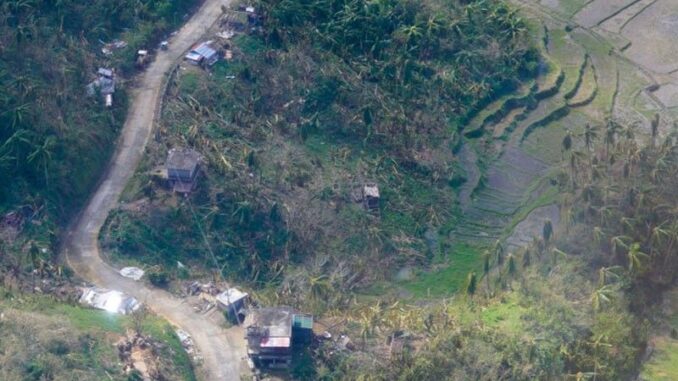
MANILA, Philippines — The combined damage of Tropical Cyclones Pepito, Nika and Ofel to the agriculture sector in at least six regions has reached P786 million, the Department of Agriculture (DA) reported.
According to the DA, the typhoons left 41,076 hectares of agricultural areas damaged and production losses of 30,366 metric tons (MT).
It said the typhoons affected 34,111 farmers and fisherfolk in the Cordillera Administrative Region, Ilocos Region, Cagayan Valley, Central Luzon, Bicol Region and Eastern Visayas.
The DA said 53 percent of the damage was recorded in rice production, totaling P414.14 million and affecting 32,289 hectares of land, with a total production loss of 19,130 MT.
Based on the data provided by the DA Operations Center, the damage from tropical cyclones Kristine and Leon to the agriculture sector totaled P9.81 billion, covering 183,877 hectares of land and production loss of 380,704 MT.
The DA said at least P1 billion in Quick Response Fund has been made available for the rehabilitation and recovery of affected areas.
Meanwhile, Sen. Loren Legarda yesterday said the impact of climate change has worsened, despite the implementations of laws.
“Our journey toward resilience is far from over. As Kristine would show, as Pepito would show, I am not certain if things have improved or have gotten worse. We see that legislation is there and funding is there, but action on the ground, impact on the ground had gotten worse because the climate has gotten worse… there is much more work to do,” Legarda said during the Philippine Resilience Awards 2024 in Pasay City.
Legarda cited Republic Act 9729, the Climate Change Act of 2009, and RA 10174, which created the People’s Survival Fund.
“We know climate change will continue to test us, but I firmly believe that the Filipino people have the strength and the ingenuity to overcome these challenges. We have seen this in the way the local communities have come together to rebuild after disasters,” Legarda said.
Robert Borje, Climate Change Commission vice chairperson, said the hazards brought by climate change are different from those seen two decades ago.
“Twenty years ago, the rainfall was only 200 millimeters. Now it’s 400 mm. So what she (Legarda) is trying to say is that in the face of climate change and worsening impacts, we have to quickly adjust to these new and intensified hazards that we have,” Borje said.
“Times have changed and the hazard of change is not just in nature but in the intensity. Developing countries like the Philippines have a lot more to work on. The capacity needs to be strengthened,” he added.
Borje said the Philippine Resilience Awards 2024 forms part of the country’s observance of the National Global Warming and Climate Change Consciousness Week 2024, in an effort to raise public awareness of the urgent need for climate action and to promote community-based resilience efforts.





Be the first to comment